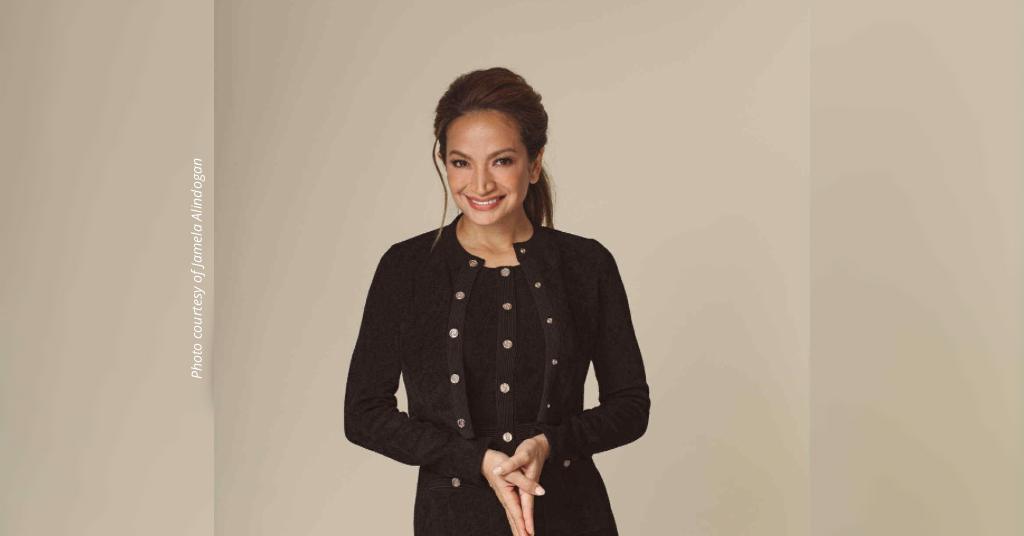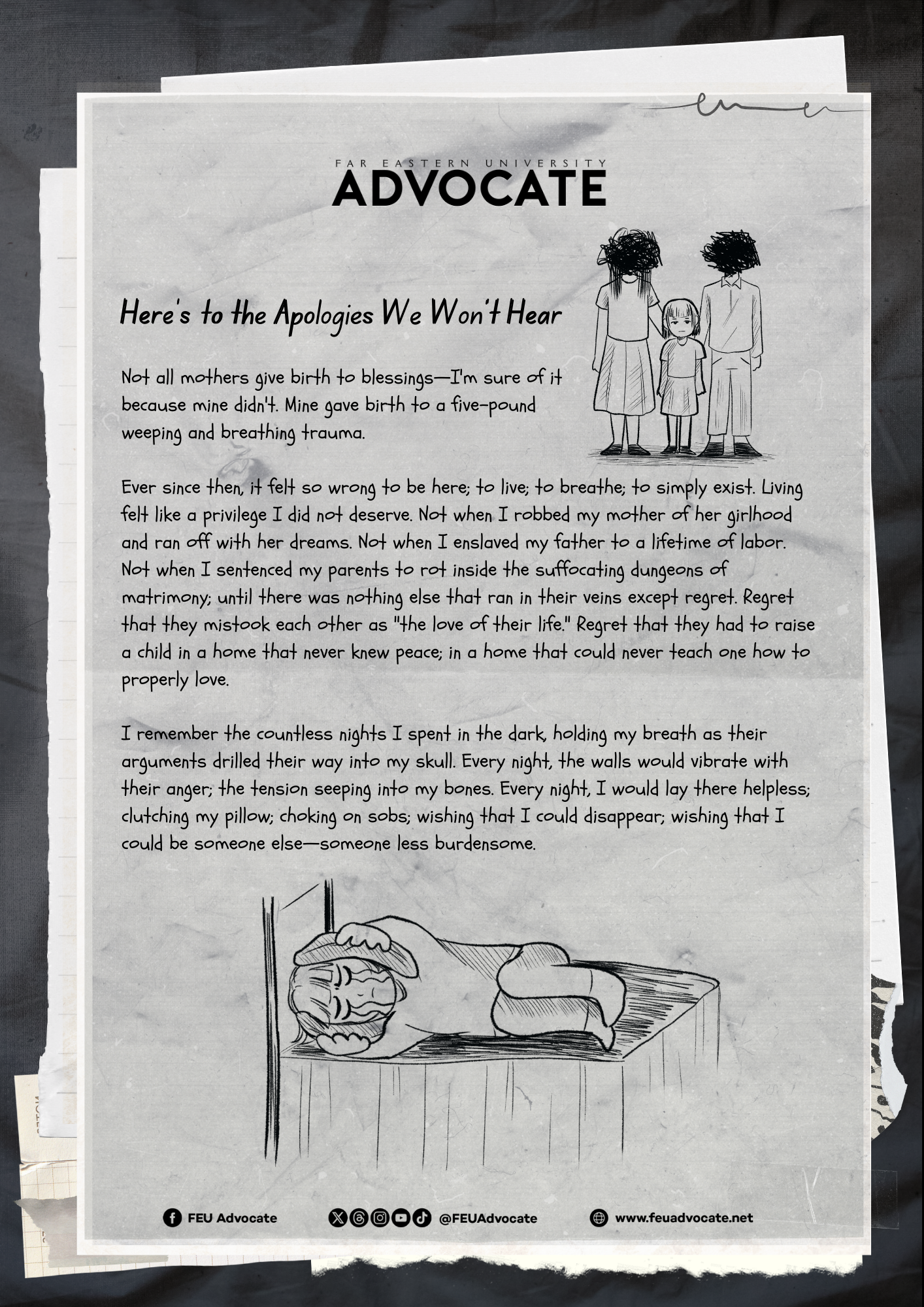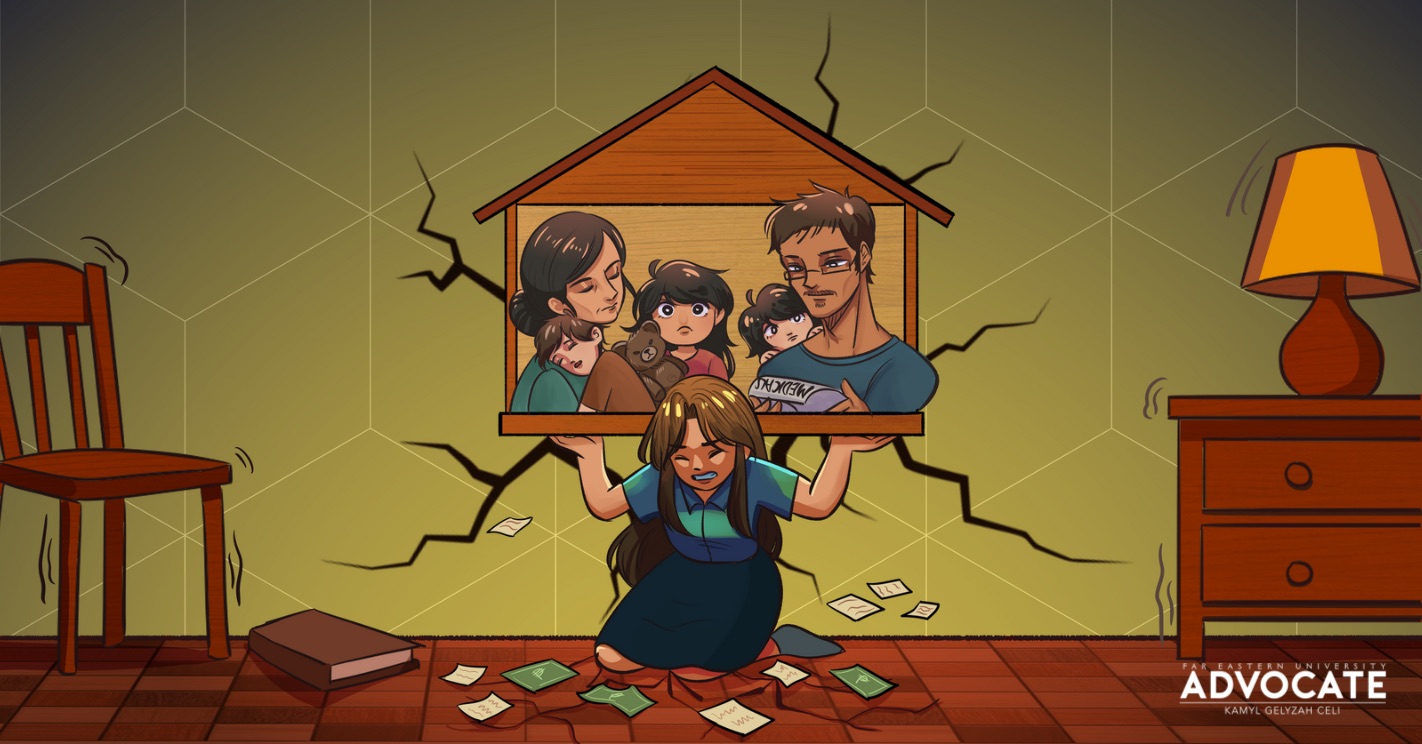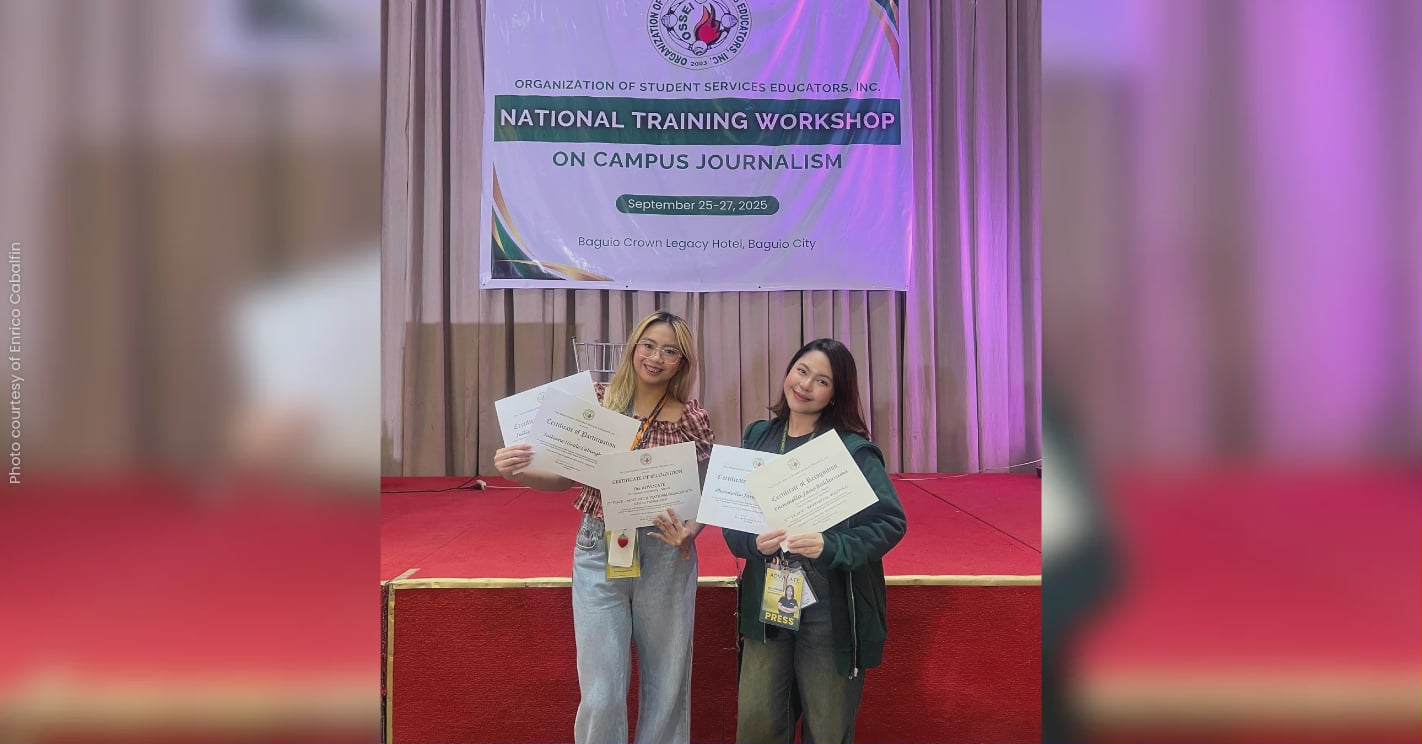
FEU-IL yields 47 lawyers in Bar 2025
- January 08, 2026 14:03
FEU Advocate
November 06, 2025 18:34

By Julienne G. Tan
Amid every protest, war, and national crisis, journalists stand at the line between chaos and truth, staying long after the cameras are gone, witnesses to the events that change the course of ordinary lives. Among these witnesses to history is Far Eastern University (FEU) alumna Jamela Alindogan, where these moments are not merely assignments but the lived reality.
From her beginnings as an FEU Communication graduate and former FEU Advocate sports writer, Alindogan has built a career defined by courageous and truthful reporting, earning local and international recognition such as the 2018 FEU Green and Gold Outstanding Alumni Award, the 2018 The Outstanding Young Men (TOYM) Award, and a place among the 2025 The Outstanding Women in the Nation’s Service (TOWNS) awardees.
She has reported for Al Jazeera English for over fifteen years, covering stories from the debris-filled streets of Marawi to protests around the world in countries such as Vietnam and Cambodia.
Today, the journalist channels her experiences into advocacy for ethical journalism, women’s rights, and humanitarian work as the founder of the Sinagtala Center for Women and Children in Conflict—believing that truth-telling is most powerful when it gives voice to the unheard.
For Alindogan, courage is not about standing in the face of danger, it is about choosing honesty when it costs less to stay quiet. Every story she tells comes from that place of conscience, a belief that journalism is both a duty and act of compassion.
The importance of good governance
Speaking before Tamaraws at the Good Governance Forum held last October 20, Jamela Alindogan highlighted that democracy is not the work of leaders alone, but a collective effort of accountability—one that demands citizen engagement, transparency, and active participation in decision-making.
In an interview with FEU Advocate, she pointed out that good governance is a shared responsibility that involves not just those in power, but the people who choose to stay engaged, starting with citizens who stay involved, speak up, and hold their leaders accountable in their own ways. It is not about waiting for better systems, she said, but about taking responsibility for how those systems work.
“No one can govern you,” she affirmed.
Alindogan explained that relying entirely on institutions or public officials to uphold integrity risks weakening democracy itself. Governance, she argued, should not be understood as a distant or technical process, but as something built daily through transparency, dialogue, and civic participation.
For her, accountability is not a one-way duty of those in power but a shared responsibility that begins with citizens who stay informed and speak up when something is wrong.
“When we rely solely on the government to practice good governance, we surrender our freedoms,” the journalist stated.
She pointed out that true progress depends on how citizens hold their leaders and themselves accountable, emphasizing that reform cannot come from authority alone. Communities, educators, and the youth all play essential parts in sustaining democratic values.
“Governance should be shared, and that would be from the bottom to the top level,” she added.
Alindogan stressed that leadership is a collective process that grows stronger when communities participate, question, and contribute to the decisions that affect their lives and country.
For FEU students, her message was direct: integrity is not confined to policies or politics. It starts in student councils, campus organizations, and classrooms, and in how people treat others, make decisions, and confront wrongdoings.
The values that guided her career—integrity, accountability, and service—were not abstract ideals but lived experiences. Her belief in shared responsibility was shaped by the same struggles that defined her early years: long nights, limited resources, and the discipline to keep going when it would have been easier to give up.
Her path to courageous journalism
To find her footing in journalism, she described herself as someone who, beyond the accolades, was ‘forged in fire,’ shaped not only by the field but also by her early years in Morayta, where she balanced classes, deadlines, and aspirations while navigating the realities of coming from a humble background.
Those years taught her persistence, integrity, and empathy—values that continue to ground her as a journalist and a humanitarian.
It was at FEU, through sleepless nights and hardships, that she began to understand what it truly meant to work for a purpose.
“My life in college was my most authentic life. It was a life of hardship, but also one of inspiration,” Alindogan reflected.
As a writer for FEU Advocate, Alindogan immersed herself in every space that honed her voice. She began as a sports writer, covering campus games before moving on to stories that explored social issues, welfare, and the everyday struggles that revealed broader realities beyond Morayta.
Outside the newsroom, her time with the FEU Cheering Squad and the FEU Oratorical and Debate Council taught her discipline, teamwork, and the confidence to speak truth with clarity, traits that continue to anchor her work as a journalist.
She remembers editing layouts late into the night inside FEU Advocate’s former small, airless office under a staircase, a space that could barely fit two or three desks. There was no air-conditioning, only the sound of written drafts being passed around.
Everything was done the old-fashioned way: manual research in libraries, handwritten notes from interviews, and articles laid out manually.
There were no instant uploads or online feedback—only the satisfaction of meeting a deadline and seeing the paper finally handed out on a Monday morning.
“Journalism was so analog that it required constant rewriting, rethinking, and staying overnight, for example, in the editing room, going through all of the pages. And then seeing that come to print and being able to go to school in the morning… on the first week of the month [and] seeing your papers distributed and read by fellow students. That was always such a joy, and it made everything so worth it,” she reminisced.
Those humble beginnings, marked by long nights, tight deadlines, and minimal resources, became the foundation of the journalism Alindogan practices today. The persistence and discipline she learned from FEU Advocate would later become the foundation she needed to report from war zones and humanitarian crises.
“Even though we had very meager resources, those were some of the best years of my life,” the journalist recalled.
Looking back, she said those experiences reminded her that the core of journalism, and life itself, is not comfort, but commitment: showing up, doing the work, and finding meaning even in struggle—proving that courage is not born from danger, but from the integrity built through consistent, honest work she took years to hone.
Courage, compassion, and staying grounded
Besides journalism, her humanitarian work also keeps her grounded. As co-founder of the Sinagtala Center for Women and Children in Conflict, Alindogan provides support for women and children in conflict zones, giving them a sense of dignity often denied by their circumstances.
“Humanitarian work gives me a sense of proportion… This is the kind of work I want to keep doing,” Alindogan affirmed.
It is through these moments, she shared, that she is reminded why compassion must remain at the heart of public service.
Through this humanitarian lens, Alindogan’s years on the field take on a deeper meaning. For more than fifteen years, she has reported from some of the world’s most difficult places—from Zamboanga and Marawi to Nigeria, Indonesia, and Hong Kong.
These experiences, she said, have shaped her not just as a journalist but as a person. As a 'boots-on-the-ground' journalist, she learned to stay calm under pressure and to see people beyond the headlines.
“You are honed and forged in fire after so many years in the field. There’s no shortcut in journalism,” she emphasized.
Amid the danger and exhaustion, Alindogan spoke about the emotional weight of her profession.
“I carry with me all the stories I’ve encountered, both good and bad, and they make up who I am,” she said.
Every report, for her, is a moral responsibility rather than a career milestone. In every assignment, she finds meaning in giving voice to the displaced and the voiceless, reminding others that empathy—not exposure—is the true heart of journalism.
“If I have three minutes of airtime, I give two to those who don’t have a voice. That’s my mandate as a woman and a journalist,” she shared.
It is this same conviction that connects her work in journalism to her advocacy for good governance. Alindogan reminded students that truth-telling is not separate from civic duty but an essential part of it. Journalism, she said, is a form of public service—one that demands accountability, transparency, and moral courage.
“When we stop asking questions or start protecting those in power, that’s when corruption thrives,” she warned.
Still, she acknowledged that courage comes with a cost. Balancing both conflict reporting and humanitarian work, Alindogan has learned to confront the burnout, fear, and the emotional strain that comes with witnessing pain.
She added that moments of rest, family, and mentorship—especially guiding the next generation of journalists—help her stay connected to her purpose.
Alindogan shared three ways she keeps herself grounded: taking care of yourself, being conscious of the world, and remembering who you do it for. To her, these are not just lessons for journalists, but for anyone striving to live with integrity.
Courage and compassion, she emphasized, are not opposing forces but essential partners. Whether in the newsroom, in governance, or in everyday life, both demand accountability, empathy, and the discipline to do what is right—even when it is not easy.
Beyond the blazing fire of passion
Alindogan shared that her faith in journalism and the country has been renewed by the younger generation.
“[In] the last few months, I’ve been reinspired by young people. I’ve pinned my hopes on the youth, this is your fight now,” she said.
She believes that today’s students possess both the awareness and the tools to create real change. In a time when information is more accessible than ever, she noted that what truly matters is how it is used—guided by conscience, integrity, and a clear sense of purpose.
“That is the one that keeps me very much inspired, it's the next generation. You can be the only one that can make it happen,” Alindogan reflected.
This belief shapes the next phase of her life. After years on the frontlines, Alindogan now focuses on passing on what the field has taught her: that truth requires both courage and care, and that journalism’s future depends on those who choose to tell stories with integrity.
“It’s time to help you be ready for the world,” she stated.
She urged Tamaraws to see courage not as grand gestures, but as the consistent choice to stay honest, accountable, and empathetic, whether in journalism, leadership, or everyday life.
As FEU continues to create spaces for conversations on truth and accountability, Alindogan’s message extends beyond the stage. In a time when truth is easily distorted and apathy feels convenient, she reminds students that integrity grows from everyday choices. Change begins when people stay informed, speak honestly, and hold themselves accountable with the same urgency they demand from their leaders.
(Photo courtesy of Jamela Alindogan)









